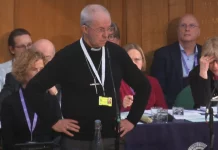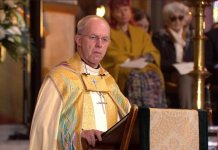Many will have seen the film, “Let there be Light”, from Matt and Beth Redman, which gives further details of their treatment by Mike Pilavachi and Soul Survivor.
It’s seems that it is not just this blog that is haunted by the words, “That’s just Mike”.
For those who have not yet watched it, the opening warning should be taken seriously – this film will undoubtedly be traumatic for some and painful to watch for anyone who takes the issues involved seriously.
Approximately eighteen minutes in, Beth Redman, describes how someone reached out to Matt and told him that there were “at least ten interns who had been massaged in their underwear on Mike’s bed.” This was the point at which they reached out to a “senior leader from a church in London”, whose matter of fact response was, “That’s just Mike – nothing will be done.”
Matt then takes up the story, “What would always come back if you spoke to someone in authority would be this phrase, ‘That’s just Mike’, and I’ve heard this phrase from so many people through the years.”
“That’s just Mike.”
But sadly, it wasn’t ‘just’ Mike, in more ways than one.
Anglicanism
Abuse of the type described in the film is not a uniquely, or even a particularly “Anglican” problem. That notwithstanding, it is right that a blog devoted to the future of orthodox Anglicanism should comment upon the Redman film for three reasons.
Number one: the abuse took place in an, albeit not always helpfully defined, influential evangelical Anglican context. There will therefore, as the film sets out, be much for other parts of that tradition to learn. Should there be any question about that, it might be noted how unhelpful it was for the Archbishop of Canterbury to deny that the Iwerne/Titus Trust camps were intrinsically “Anglican”.
Number two: this blog is concerned with Anglicanism that is biblically faithful and that means owning the sin within, as well as the sin without, not least by acknowledging and honouring what the Redman’s have shared.
Number three: it is rightly stated in the video that, “abuse is endemic in the church”, and it would be hard to argue it is any less widespread in the evangelical part of the Church of England than any other. This may be partly because of the type of dynamics Dr Diane Langberg and others describe – making these areas of the CofE attractive to those who abuse.
But experience suggests that many with the power of posts, pulpits, platforms and publishing deals would like to deny the endemic nature of the abuse, not least because they may be part of it. Over and over again, when those concerned about the behaviour of Mike Pilavachi, or Jonathan Fletcher or Ravi Zacharias, or so many others, have approached those with power, their response has been the same – “That’s just….”. And later, when faced with irrefutable evidence, they try to suggest there isn’t a serious problem in the culture and it is just a case of “a few bad apples”, but the evidence suggests otherwise.
Dan and Susie Leafe (one of the Trustees and the Director of Anglican Futures) have, over the last five years, had personal contact with more than 100 survivors of at least 25 abusive situations in conservative Evangelical Anglicanism alone (without any reference to the Pilavachi or Ravi Zacharias cases). Those twenty-five situations were distinct, not least for the survivors, but also sufficiently related for them to be described as a “culture”. The other trustees of Anglican Futures have their own stories.
With that in mind, the following observations are offered on Mr and Mrs Redman’s brave testimony, and it is indeed brave. For Matt and Beth Redman to be willing to allow the world to enter into their suffering is a remarkable act of self-sacrificial leadership. They didn’t have to do it. Worse, as Matt intimates at the end of the film, there will be many voices privately, and some publicly, who criticise their doing so.
But if we are willing to listen, their courage will not be wasted and the days when, it is considered appropriate to meet concerns raised about powerful people’s behaviour, with a phrase like “That’s just Mike, ” will be over.
Recognise the reality of the suffering caused by silencing, shunning, shaming.
What Matt and Beth describe in this video is abuse. And it is serious abuse. However courageously the Redman’s present, surely no one can look at the pain on their faces and in their words, pain that has been present for years, and not fully accept just how awfully they have suffered. Their suffering, and nothing else, defines the gravity of what took place. It is not for the powerful to define or categorise the experiences of the weak, vulnerable or oppressed. Dr Chi-Chi Obuaya‘s words on that finally need to be heeded.
“Abuse doesn’t have to be of a sexual nature for it to be significant. The very nature of trauma is that people respond differently to it, so it’s not helpful to draw a conclusion as to whether someone has experienced what they feel is severe trauma. We just don’t know what a particular individual’s experience may have been. Some people who experience abuse whether it’s broad-based or spiritual abuse may experience depression another person may experience panic attacks. In other cases it may be less well defined in terms of a formal psychiatric diagnosis. But I’d want to emphasize the importance of this topic because it can have significant and, in some cases, long lasting effects on the mental health of the person that’s been affected.”
Let no one ever question again that silencing, shunning and shaming – what is collectively known as ‘ghosting’- can be profound emotional and, in the church context, spiritual, abuse. They are “active omissions” which consistently are open to most powerful leaders, and very, very hard to prove in a climate of general scepticism about church abuse. Indeed, in this present instance, the ghosting would probably not have come to light and been accepted without the physical acts that Pilavachi perpetrated being known.
In summary, the church, like the natural family has a unique capacity to do good, but also a unique capacity to do harm. Context matters – what might be ‘less’ harmful in another context is deeply harmful in the church with its promises of how leaders will behave, its expected openness and vulnerability and with the level of trust that can rightly be expected. The utter betrayal of those values accompanied by the ongoing pretence of superior godliness is all too painful to bear.
This should, perhaps, lead to Christians being more curious than many influential leaders would encourage. When Christians ‘mysteriously’ disappear almost overnight from jobs, roles, conferences, churches, platforms, relationships or organisations, the powerful rely on people not to notice, or not to question and upon peoples’ instinctive assumption that some wrongdoing by the absentee is being kindly kept quiet. But hear from the Redman’s, the Hughes’ and so many others, that it is just as likely that the absentee has been ‘sidelined’ for ‘stepping out of line’ by those more powerful than themselves or felt unable to remain associated with an abusive ministry. It is a healthy curiosity that will help to reveal if it is the individual or the culture that is at fault.
Recognise the reality of the suffering caused by dismissing people’s concerns
Those who report abusive behaviour have often already been sidelined and some have been silenced for years. When they do have the courage to speak up, Dr Chi-Chi Obuaya explains how important it is to listen to their experiences.
“When I have seen people going through these sorts of experiences, the most painful thing for them is not being believed, and so it’s really important that we should be slow to draw conclusions and to have advice or a solution. First and foremost, it’s really important to listen to what’s being said. Being validated is one of the most important parts of beginning this journey towards recovery.”
Beth Redman describes what happens when senior leaders choose not to listen and instead dismiss the concerns of those who have been abused.
“So, the chaps went to the Chair of the Trustees, they just said this is what’s happening and described these patterns of behaviour that had been going on at this point for quite a few years. And basically, in summary, just said, you know, ‘You’re silly boys – you need to grow up’. It was completely shut down – it wasn’t validated, it wasn’t concerning – it was a maturity issue. So that was really brutal.”
Tim and Pete Hughes, have now said they were among those at that meeting.
“In 2004, we confronted Mike regarding his damaging behaviour and then subsequently brought it to the attention of the chairman of the Soul Survivor Ministries trustees. Our desire was to protect others who may have been impacted by this behaviour and to fight for the spiritual health and vitality of the ministry.
Unfortunately, the process was not received well and our concerns were not taken seriously, leading to breakdowns in relationship and eventually to both of us leaving Soul Survivor soon after. We’ve both been deeply saddened to learn of the stories of abuse that have continued since that time.”
Recognise the dynamics of loyalty
Widespread, or deep, loyalty to leaders, or their ‘popularity’, is not a sign that they are healthy leaders. As the Pilavachi case shows, and Dr Langberg and Matt Redman explain, the opposite can be the case. It is “super hard” and “complicated” to “go against everyone to speak the truth and leave” an abuser and all the more so given the dynamics of victims feeling “special” in “God’s work” and desire to honour that work in ways that become increasingly psychologically “twisted”.
In just the same way, just because a ministry leads to “being full of people in the pews”, it is not proof that all is well – again, it may well be the opposite – people may be working to “protect the system” out of misplaced loyalties. If a leader is too important to be brought down, they are by definition a problem.
Recognise that wolves can look like sheep
Many are blinded by what some have called the ‘myth of homogeneity’ – which presumes an individual cannot behave differently with different people. Those who have only experienced the positive aspects of the person who is being criticised, may be unwilling to entertain the idea that someone so kind, so godly, so wise could also be so cruel or abusive.
This is what Matt Redman describes, when he says:
“Even at that point there’s quite a large group of people still saying, ‘No, I think it was exaggerated,’ or, ‘No, I can’t bring myself to believe this’, or, ‘Mike, you’ll always be a hero to me.’ And that’s a really disturbing thing that we have to look at in our church culture.”
It is important to remember that Jesus himself warned us that the wolf would come dressed in sheep’s clothing (Matt 7:15) and take seriously every cry for help.
Recognise the need for change
With power in Anglicanism comes responsibility in Anglicanism.
Beth Redman must be right when she says:
“We have to have systems in place where there is effective reporting – that there is a leadership structure where people can be heard and complaints, or whatever you want to call them, be taken seriously and be investigated. It is important that there’s a process that is followed and maybe, just maybe, there will be change in the church and we will improve our safeguarding and our reporting and our support of survivors.”
And that will require collective action and individual action.
Collective Action
Many have been encouraged to see the breadth and depth of unity that orthodox Anglicans have achieved in the face of the challenges of the Living in Love and Faith/Prayers of Love and Faith processes. Tribalism has been set aside, networks have been prepared to co-operate, and historic tensions, even enmities, overcome. If, however this can be done to ensure that the status quo, or something better, prevails in the Church of England (and particularly so for clergy) it will look an awful lot like navel gazing at best, and blatant self-interest at worst, if the same cannot be achieved in the face of the rank evil which is abuse in the same circles.
And yet there is no sign of that. While untold resources and unprecedented co-operation can be found for collective action to confront revisionism, the resources committed to confronting abuse are all but non-existent, and the voices, if raised at all, are extremely muted. There is no evidence of accountability across networks or even caution being shown as to who is actually suitable in terms of character to be part of any united effort.
Individual Action
Individually, but, if necessary, by that collective challenge, those who have enjoyed for so long the power and privileges of being part of the established church, leading networks, parachurch organisations and large, wealthy, influential churches need to take responsibility for what has gone wrong on their watch. The report of the independent safeguarding charity ThirtyOne:Eight into the abuser Jonathan Fletcher explained that for quite a number taking that responsibility will begin and end with their resignations from all forms of public ministry.
‘It is the opinion of the Reviewers that the aspects of unhealthy culture at ECW and more broadly across the affected CE constituency might only be addressed fully by those having played a key role in the establishment and maintenance of that culture to no longer enjoy the influence they have had to date (i.e. considering their positions and stepping down).’ (p.11).
That was three years ago, and the fact that nothing much has changed in the intervening years, simply makes the case for reform all the more urgent and, not least in the light of the growing understanding brought about by those like the Beth and Matt, the position of those who have not resigned, all the more untenable.
And it is not just those who have been in power – the prime qualification to be a credible orthodox Anglican leader in the future will surely be to understand what is needed for the brighter era Beth Redman envisages. And that will mean a willingness to say what has gone wrong in the last 40+ years, where it went wrong, how it happened, who was responsible, and how they will lead differently. Without the courage to say who had feet of clay, the disastrous legacy of those who have failed in the past is all too likely to carry on into the future.
In conclusion
Evangelical Anglicanism is indebted to Beth and Matt and to all the other survivors, anonymous or otherwise, who have been willing and able to speak out in recent years. There is no reward other than the eternal one, and much sharing in the sufferings of Christ in the meantime.
They, along with those who walk with them, may be dismissed as ‘having an agenda’ or being ‘obsessed’ and perhaps that is true. But perhaps being obsessed with the beaten down, those who are lying in the gutter and those whose suffering is compounded by the arrogant disregard of privileged religious leaders passing by on their way to their acts of public piety, isn’t such a bad thing.
As Dr Diane Langberg said:
“When you feel overwhelmed in exposing truth, remember this: people are sacred, created in the image of God. Systems are not. They are only worth the people in them and the people they serve. And people are to be treated, whether one or many, the way Jesus Christ treated people.”
If the reader is so minded, do join in the prayer that follows the video post on the Premier Christianity website, find out more about the unhealthy dynamics which operate in these cultures, and for those personally affected by these issues do click on the QR code below to find the type of help described in the film.











